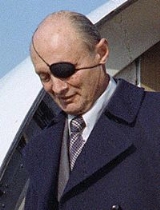
Moshe Dayan
Overview
Israel Defense Forces
The Israel Defense Forces , commonly known in Israel by the Hebrew acronym Tzahal , are the military forces of the State of Israel. They consist of the ground forces, air force and navy. It is the sole military wing of the Israeli security forces, and has no civilian jurisdiction within Israel...
(1953–58), he became a fighting symbol to the world of the new State of Israel
Israel
The State of Israel is a parliamentary republic located in the Middle East, along the eastern shore of the Mediterranean Sea...
. He went on to become Defense Minister and later Foreign Minister of Israel.
Moshe Dayan was born on Kibbutz
Kibbutz
A kibbutz is a collective community in Israel that was traditionally based on agriculture. Today, farming has been partly supplanted by other economic branches, including industrial plants and high-tech enterprises. Kibbutzim began as utopian communities, a combination of socialism and Zionism...
Degania Alef near the shores of Lake Kinneret (Sea of Galilee
Sea of Galilee
The Sea of Galilee, also Kinneret, Lake of Gennesaret, or Lake Tiberias , is the largest freshwater lake in Israel, and it is approximately in circumference, about long, and wide. The lake has a total area of , and a maximum depth of approximately 43 m...
) in pre-Mandate Palestine
Palestine
Palestine is a conventional name, among others, used to describe the geographic region between the Mediterranean Sea and the Jordan River, and various adjoining lands....
.
Unanswered Questions
Quotations
There is no more Palestine. Finished . . .![]()
TIME Magazine (30 July 1973)
It is not in our hands to prevent the murder of workers… and families… but it is in our hands to fix a high price for our blood, so high that the Arab community and the Arab military forces will not be willing to pay it.![]()
As quoted in Warrior: the autobiography of Ariel Sharon (1989)
We have no solution, you shall continue to live like dogs, and whoever wishes may leave, and we will see where this process leads.![]()
Yossi Beilin, Mehiro shel Ihud (Revivim, 1985), 42 speaking of the Palestinians

